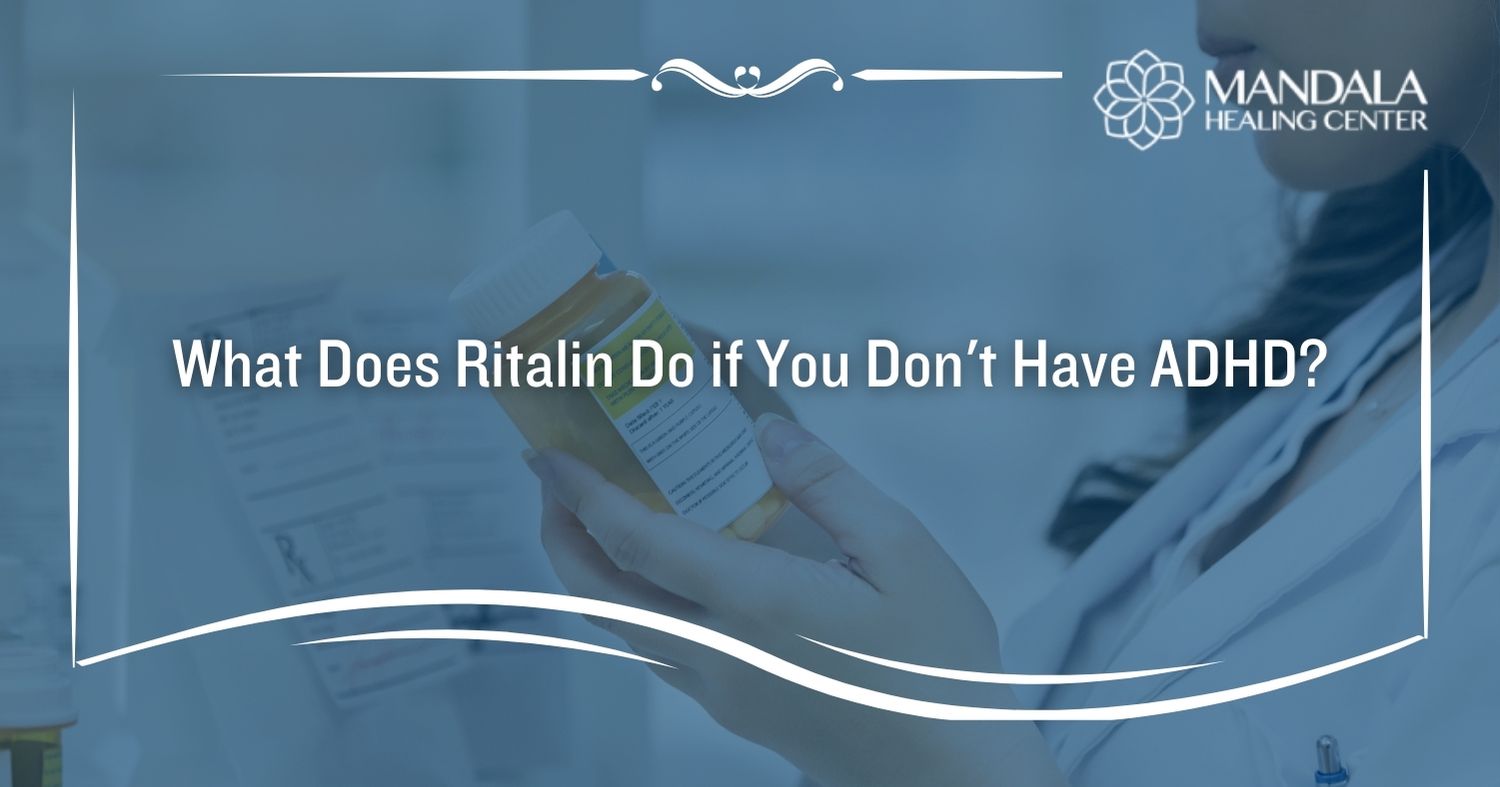Ritalin is a prescription stimulant that increases activity in the central nervous system (CNS). It is typically prescribed to help people manage symptoms of attention deficit disorders, including poor focus, hyperactivity, and impulsivity. Like Adderall, Ritalin increases and enhances the effects of neurotransmitters related to focus, behavior, and problem-solving.
Sometimes, people take Ritalin and other CNS stimulants without a prescription to increase focus and enhance performance at school or work. Typically, people buy Ritalin from someone with a prescription or steal it from friends or family. Ritalin can be addictive, and people without ADHD may have unanticipated side effects if they take it.
It’s crucial to understand the risks of taking Ritalin without a prescription and to seek treatment immediately if you do. Without getting help, the consequences of Ritalin abuse can quickly become severe.
You don’t have to manage substance abuse alone. Caring, effective treatment is just a phone call away. Learn more about Ritalin abuse and find treatment to overcome it by contacting the Mandala Healing Center Team today.
How Does Ritalin Work?
Neurotransmitters are chemicals in your brain that control many functions throughout the body and help nerve cells communicate with each other. Ritalin works by raising levels of a neurotransmitter called dopamine, which is involved with action, thinking, and motivation. Dopamine is also directly related to feelings of pleasure and reward.
People with ADHD and other attention deficit disorders generally have lower-than-average dopamine levels. Low dopamine levels can make it difficult for people to focus on a task long enough to complete it. As a result, people with ADHD may seem to have short attention spans and find it challenging to follow through on mundane activities like chores and schoolwork.
Ritalin blocks molecules from absorbing dopamine, allowing more of it to be available in the brain. Increased dopamine levels can result in a better mood and motivation during tasks. People with ADHD who take Ritalin often feel more motivated to complete tasks and follow through with plans and ideas.
The Side Effects of Ritalin
Like all medications, Ritalin can cause unwanted side effects. Some of the most common side effects of Ritalin include:
- Headache
- Dizziness
- Nausea and vomiting
- Loss of appetite
- Weight loss
- Trouble sleeping
- Nervousness or anxiety
People who take Ritalin with a prescription should talk to their doctor if they experience unwanted side effects when taking this medication.
What Happens if You Take Ritalin But Don’t Have ADHD?
Ritalin abuse has risen as people turn to the drug for its performance-enhancing capabilities. Sometimes called a “study drug,” Ritalin can give people without ADHD a boost of energy and focus, allowing them to complete tasks or concentrate on a subject for longer.
While researchers have studied Ritalin’s effects on people with ADHD, there is very little information about the long-term risks of using the drug without an attention disorder. However, common side effects of Ritalin abuse have been reported and include:
- Depression
- Problematic appetite reduction and weight loss
- Excessive excitability
- Agitation
- Increased impulsivity
- Mood swings
- Poor and disrupted sleep
Research shows that using Ritalin without a prescription may lead to long-term problems, including:
- Paranoia
- Repetitive actions similar to OCD
- Hallucinations
- Violent tendencies
- Grandiosity
Taking Ritalin without having ADHD may also lead to sedation, drowsiness, and mood changes. Taking any prescription medication without a doctor’s guidance and supervision is dangerous. Using Ritalin without having ADHD may lead to unanticipated, severe side effects that require intervention and treatment.
Recognizing Ritalin Abuse
Ritalin is classified as a Schedule II drug, meaning the DEA has determined it has a high potential for abuse. Recognizing the signs of Ritalin abuse can help you seek the treatment you need to safely stop using this potent stimulant and move forward in your life.
Some signs of Ritalin abuse include:
- Decreased appetite
- Significant weight loss
- Dilated pupils
- Fatigue
- Depression
- Headaches
- Sweating
- Agitation
- Insomnia
- Vision changes
- Stomach pain
- Rapid heart rate
People who take Ritalin without a prescription may develop dependence or addiction. Prescription stimulants like Ritalin do not have the same risk of addiction as other drugs like cocaine, but repeated or heavy use can cause changes in the brain that make it very difficult to stop using it without treatment.
People who have become dependent on Ritalin may experience uncomfortable withdrawal symptoms if they stop. These withdrawal symptoms aren’t typically dangerous, but they can make it more likely someone will relapse before they detox completely.
People with Ritalin abuse or dependence must receive comprehensive treatment and ongoing support to safely stop using the drug and avoid relapse.
Find Help For Ritalin Abuse Now
If you or someone you love struggles with Ritalin abuse, you are not alone. Effective treatment is available. Reach out now to the Mandala Healing Center team to learn about our holistic prescription drug addiction treatment programs or to find support during any stage of your recovery.
References:
- Food and Drug Administration: Ritalin Label, Retrieved August 2023 from https://www.accessdata.fda.gov/drugsatfda_docs/label/2013/010187s077lbl.pdf
- National Library of Medicine: Methylphenidate, Retrieved August 2023 from https://www.ncbi.nlm.nih.gov/books/NBK482451/
- National Library of Medicine: Methylphenidate Abuse and Psychiatric Side Effects, Retrieved August 2023 from https://www.ncbi.nlm.nih.gov/pmc/articles/PMC181133/












